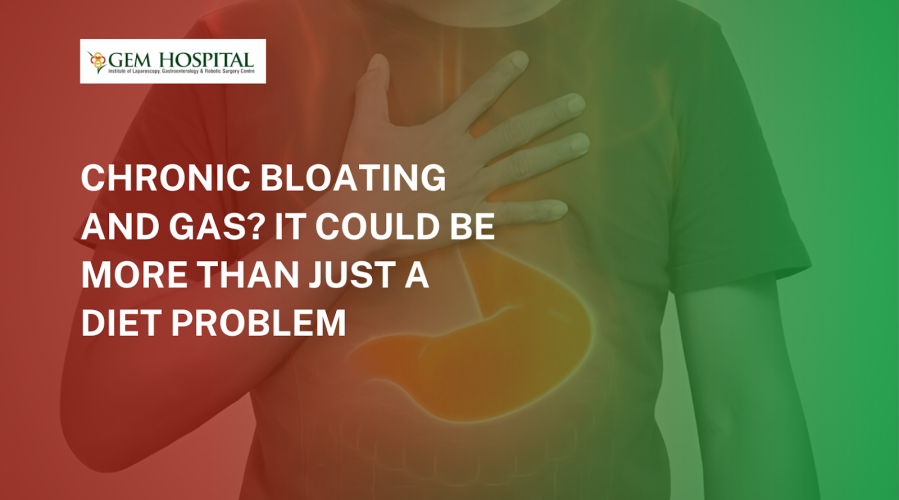Consult experienced hernia doctors in Chennai for expert surgical care. Advanced diagnosis, safe hernia surgery, and faster recovery with specialized treatment.
Chronic Bloating and Gas? It Could Be More Than Just a Diet Problem

You're likely familiar with that unpleasant, swollen stomach after a large meal, but what about the sensation of bloating that doesn't seem to go away? What if bloating, gas, stomach pressure, and feeling full become a daily occurrence? You're not alone, and it may not just be "something you ate."
Diet plays a major contributing factor to digestive health, but many times, chronic bloating, gas, and feeling full, indicated by unhealthy digestion, can have contributing factors far more complex than temporary food intolerance. If you deal with bloating, gas, and fullness on and off for weeks or even months, it may be time to explore whether there is an underlying medical cause.
Here, we will discuss the top hidden causes behind chronic bloating and the point at which you can stop self-diagnosing and visit a specialist.
When Bloating Becomes “Chronic”
Occasional bloating is common, but when you feel swollen, gassy, or overfull more than three times each week for over 3–4 weeks, it may be chronic.
Unlike temporary discomfort, such as when one overeats or timing the consumption of high-fiber foods, chronic bloating typically makes dietary experience changes irrelevant. That red flag you see is your gut indicating there is a problem.
Top Chronic Bloating Causes (Beyond Just Food)
Let's delve into some commonly overlooked chronic bloating causes that may be influencing your well-being.
1. Irritable Bowel Syndrome (IBS)
IBS is one of the most common reasons for chronic bloating and gas. IBS is a functional gastrointestinal disorder. The structure of your intestines may be normal, but the intention in which they function is not.
Symptoms include:
- Bloating that worsens during the day
- Abdominal pain or cramping
- Irregular bowel movements (diarrhea, constipation, or both)
IBS can be caused by stress, food, or hormones, and it requires a customized management plan beyond just dietary changes.
2. Small Intestinal Bacterial Overgrowth (SIBO)
At times, bacteria that are typically found in the large intestine begin to grow in the small intestine, a condition known as SIBO. This is one of the chronic bloating causes, as it leads to early fermentation of food, resulting in gas, bloating, and discomfort.
Signs of SIBO include:
- Bloating right after meals
- Chronic belching
- Diarrhea or greasy stools
- Fatigue or brain fog
SIBO is often misdiagnosed as IBS, but it needs specialized testing and treatment with targeted antibiotics or probiotics.
3. Lactose or Fructose Intolerance
As we age and encounter infections, our gut enzymes change and you can become intolerant to lactose (milk sugar) and/or fructose (fruit sugar) despite having dairy or fruits your whole life.
In lactose and fructose intolerance the sugars are not fully digested and start to ferment in the gut- causing gas and bloating. A simple hydrogen breath test can detect intolerance.
4. Gluten Sensitivity or Celiac Disease
Celiac disease is an autoimmune disease in which gluten (wheat) attacks the lining of your small intestine. Even without celiac, however, many individuals suffer from non-celiac gluten sensitivity where gluten leads to bloating, fatigue, and abdominal pain. You are most likely to experience the symptoms after having:
Symptoms often worsen after:
- Bread, pasta, or wheat-based foods
- Alcohol or beer
- Baked goods
If gluten is a consistent trigger, testing is essential before eliminating it from your diet.
5. Gynecological Conditions
In addition to potential digestive disorders, women may experience bloating from gynecological conditions such as:
- Endometriosis
- Ovarian cysts
- Hormonal imbalances (e.g., PMS, PCOS)
This type of bloating tends to be cyclical and may also be accompanied by pelvic pain, irregular periods, or backache. Take note of these symptoms- it is important to seek input from a gynecologist.
6. Digestive Enzyme Deficiency
Your body uses digestive enzymes to break down carbohydrates, fat and protein. A deficiency in these enzymes (which can occur after surgery, due to chronic illness, and just with age) will result in incomplete digestion and excess gas production.
Common signs:
- Feeling full quickly
- Floating stools or undigested food in stool
- Nausea or burping after meals
7. Constipation
Chronic constipation doesn't only lead to discomfort from bloating, but also leads to a buildup of stool in your colon as well as a buildup of gas which can expand your abdomen as well. Constipation is caused from dehydration, lack of fiber, thyroid issues and even neurological conditions. Not eliminating your stool regularly can definitely contribute to bloating and may be the answer to chronic bloating problems.
When to See a Specialist
Bloating can be a symptom of a bigger issue. If you’ve already made dietary changes to avoid trigger foods but still feel unwell, it's time to explore chronic bloating causes with a proper medical assessment.
Red flags include:
- Bloating that worsens over time
- Unintentional weight loss
- Blood in stool
- Severe fatigue
- Abdominal lump or visible swelling
These could signal more serious issues like inflammatory bowel disease (IBD), gastrointestinal tumors, or other chronic conditions that need expert care.
Stop Guessing. Start Healing With GEM Hospital.
At GEM Hospital we don’t treat just the symptoms, we identify the underlying cause.
Our team of expert gastroenterologists, dietitians, and diagnostic experts collaborates to identify and treat your individual digestive challenges whether it is SIBO, IBS, or something more complex.
Why would you continue to live with a problem when the solution is just one consultation away?
If you can’t stop the bloating and gas,Book an appointment at GEM Hospital and take the first step to recovery from your chronic symptoms.
Blogs & Article
Get advanced liver transplant treatment in Chennai with expert surgeons, modern technology, and comprehensive care for safe and successful outcomes.
Get advanced piles treatment in Erode with expert doctors. Safe procedures, modern technology, and effective care for fast relief and recovery.


